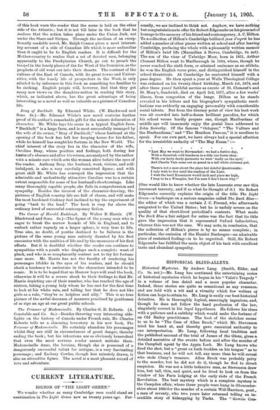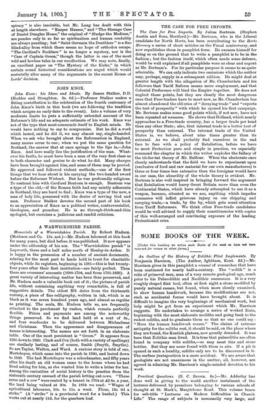Historical Mysteries. By Andrew Lang. (Smith, Elder, and Co. Os.
net.)—Mr. Lang has continued the entertaining series of historical mysteries which he began in his "Valet's Tragedy" in a volume of less detail and a more popular character. Indeed, these stories are quite as sensational as any romance, and are told with a wit and a vivacity which few writers of fiction can hope to attain to. Mr. Lang is easily our best historical detective. He is thoroughly logical, amazingly ingenious, and, though he does not follow the hard profession of the law, singularly correct in his legal hypotheses. He follows his clues with a patience and a subtlety which would make the fortune of an Old Bailey practitioner. The best of the sketches seems to us to be "The Case of Allan Breck," which Mr. Stevenson tried his hand at, and thereby gave canonical authority to one interpretation. Mr. Lang, following local tradition and the published account of the trial of James of the Glens, gives a detailed narrative of the events before and after the murder of the Campbell agent by the Appin Loch. Mr. Lang knows who fired the shot, but a "great ox bath trodden on his tongue " as to that business, and he will not tell, any more than he will reveal who stole Cluny's treasure Allan Breck was probably privy to the murder, but he did not do it, though he fled to divert suspicion. He was not a little talkative man, as Stevenson drew him, but tall, thin, and quiet, and he lived to look on from the window of his Paris lodging at the early riots of the French Revolution. The best mystery which is a complete mystery is the Campden affair, where three people were hung in Gloucester- shire about 1660 for the murder of a certain Will Harrison, gent., a man of seventy, who two years later returned telling an in- credible story of kidnapping by Turks. The " Gowrie Con.
spiracy " is also insoluble, but Mr. Lang has dealt with this at length elsewhere. " gasper Hauser," and " The Strange Case of Daniel Dunglas Home," the original of " Sludge the Medium," are puzzles only in so far as spiritualism and human credulity are always puzzling; but " Saint Germain the Deathless " is a fine blind-alley from which there seems no hope of orthodox escape. "The Cardinal's Necklace " is no longer a mystery, nor is the "Case of Captain Green," though the latter is one of the most wild and lawless tales in our recollection. We may note, finally, an excellent paper on "The Mystery of the Kirks," in which certain sound historical considerations are urged which would materially alter many of the arguments in the recent House of Lords' decision.
JOHN KNOX.







































 Previous page
Previous page